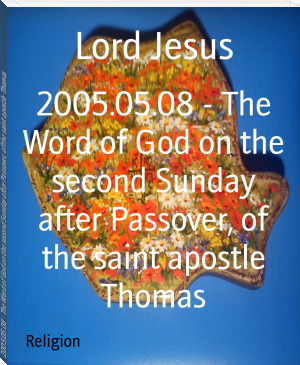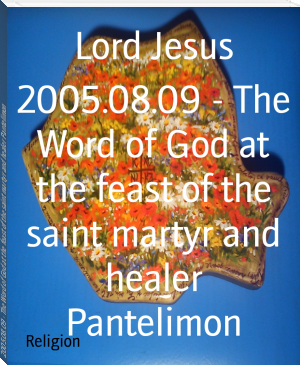The Story of a Soul - Saint Thérèse de Lisieux (best color ereader .TXT) 📗

- Author: Saint Thérèse de Lisieux
- Performer: -
Book online «The Story of a Soul - Saint Thérèse de Lisieux (best color ereader .TXT) 📗». Author Saint Thérèse de Lisieux
Indeed her prayers had gained me this unspeakable favour—a smile from the Blessed Virgin! When she saw me with my eyes fixed on the statue, she said to herself: "Thérèse is cured!" And it was true. The Little Flower had come to life again—a bright ray from its glorious Sun had warmed and set it free for ever from its cruel enemy. "The dark winter is past, the rain is over and gone,"[7] and Our Lady's Little Flower gathered such strength that five years later it opened wide its petals on the fertile mountain of Carmel.
As I said before, Marie was convinced that Our Blessed Lady, while restoring my bodily health, had granted me some hidden grace. So, when I was alone with her, I could not resist her tender and pressing inquiries. I was so astonished to find my secret already known, without my having said a word, that I told her everything. Alas! as I had foreseen, my joy was turned into bitterness. For four years the remembrance of this grace was a cause of real pain to me, and it was only in the blessed sanctuary of Our Lady of Victories, at my Mother's feet, that I once again found peace. There it was restored to me in all its fulness, as I will tell you later.
This is how my joy was changed into sadness. When Marie had heard the childish, but perfectly sincere, account of the grace I had received, she begged my leave to tell them at the Carmel, and I did not like to refuse her. My first visit there after my illness was full of joy at seeing Pauline clothed in the habit of Our Lady of Carmel. It was a happy time for us both, we had so much to say, we had both suffered so much. My heart was so full that I could hardly speak.
You were there, dear Mother, and plainly showed your affection for me; I saw several other Sisters too, and you must remember how they questioned me about my cure. Some asked if Our Lady was holding the Infant Jesus in her arms, others if the Angels were with her, and so on. All these questions distressed and grieved me, and I could only make one answer: "Our Lady looked very beautiful; I saw her come towards me and smile." But noticing that the nuns thought something quite different had happened from what I had told them, I began to persuade myself that I had been guilty of an untruth.
If only I had kept my secret I should have kept my happiness also. But Our Lady allowed this trouble to befall me for the good of my soul; perhaps without it vanity would have crept into my heart, whereas now I was humbled, and I looked on myself with feelings of contempt. My God, Thou alone knowest all that I suffered! ______________________________
[1] Marie Guérin entered the Carmel at Lisieux on August 15, 1895, and took the name of Sister Mary of the Eucharist. She died on April 14, 1905, aged thirty-four.
[2] With the Carmelites the grating is only opened for near relatives and very young children. [Ed.]
[3] "Pauline" has several times been Prioress of the Carmel of Lisieux, and in 1909 again succeeded to that office on the death of the young and saintly Mother Mary of St. Angelus of the Child Jesus. [Ed.]
[4] John 11:4.
[5] Mme. Guérin died holily on February 13, 1900, aged fifty-two. During her illness Thérèse assisted her in an extraordinary way, several times making her presence felt. Monsieur Guérin, having for many years used his pen in defence of the Church, and his fortune in the support of good works, died a beautiful death on September 28, 1909, in his sixty-ninth year. [Ed.]
[6] It was in this small church—once deserted and to-day perhaps the most frequented in Paris—that the saintly Abbé Desgenettes was inspired by Our Lady, in 1836, to establish the Confraternity of the Immaculate Heart of Mary for the conversion of sinners. [Ed.]
[7] Cant. 2:11.
______________________________
CHAPTER IV FIRST COMMUNION AND CONFIRMATIONWhile describing this visit to the Carmel, my thoughts are carried back to the first one which I paid after Pauline entered. On the morning of that happy day, I wondered what name would be given to me later on. I knew that there was already a Sister Teresa of Jesus; nevertheless, my beautiful name of Thérèse could not be taken from me. Suddenly I thought of the Child Jesus whom I loved so dearly, and I felt how much I should like to be called Teresa of the Child Jesus. I was careful not to tell you of my wish, dear Mother, yet you said to me, in the middle of our conversation: "When you come to us, little one, you will be called 'Teresa of the Child Jesus.'" My joy was great indeed. This happy coincidence of thought seemed a special favour from the Holy Child.
So far I have not said anything about my love for pictures and books, and yet I owe some of the happiest and strongest impressions which have encouraged me in the practice of virtue to the beautiful pictures Pauline used to show me. Everything was forgotten while looking at them. For instance, "The Little Flower of the Divine Prisoner" suggested so many thoughts that I would remain gazing at it in a kind of ecstasy. I offered myself to Our Lord to be His Little Flower; I longed to console Him, to draw as near as possible to the Tabernacle, to be looked on, cared for, and gathered by Him.
As I was of no use at games, I should have preferred to spend all my time in reading. Happily for me, I had visible guardian angels to guide me in this matter; they chose books suitable to my age, which interested me and at the same time provided food for my thoughts and affections. I was only allowed a limited time for this favourite recreation, and it became an occasion of much self-sacrifice, for as soon as the time had elapsed I made it my duty to stop instantly, even in the middle of a most interesting passage.
As to the impressions produced on me by these books, I must frankly own that, in reading certain tales of chivalry, I did not always understand the realities of life. And so, in my admiration of the patriotic deeds of the heroines of France, especially of the Venerable Joan of Arc, I longed to do what they had done. About this time I received what I have looked on as one of the greatest graces of my life, for, at that age, I was not favoured with lights from Heaven, as I am now.
Our Lord made me understand that the only true glory is that which lasts for ever; and that to attain it there is no necessity to do brilliant deeds, but rather to hide from the eyes of others, and even from oneself, so that "the left hand knows not what the right hand does."[1] Then, as I reflected that I was born for great things, and sought the means to attain them, it was made known to me interiorly that my personal glory would never reveal itself before the eyes of men, but that it would consist in becoming a Saint.
This aspiration may very well appear rash, seeing how imperfect I was, and am, even now, after so many years of religious life; yet I still feel the same daring confidence that one day I shall become a great Saint. I am not trusting in my own merits, for I have none; but I trust in Him Who is Virtue and Holiness itself. It is He alone Who, pleased with my feeble efforts, will raise me to Himself, and, by clothing me with His merits, make me a Saint. At that time I did not realise that to become one it is necessary to suffer a great deal; but God soon disclosed this secret to me by means of the trials I have related.
I must now continue my story where I left off. Three months after my cure Papa took me away for a change. It was a very pleasant time, and I began to see something of the world. All around me was joy and gladness; I was petted, made much of, admired—in fact, for a whole fortnight my path was strewn with flowers. The Wise Man is right when he says: "The bewitching of vanity overturneth the innocent mind."[2] At ten years of age the heart is easily fascinated, and I confess that in my case this kind of life had its charms. Alas! the world knows well how to combine its pleasures with the service of God. How little it thinks of death! And yet death has come to many people I knew then, young, rich, and happy. I recall to mind the delightful places where they lived, and ask myself where they are now, and what profit they derive to-day from the beautiful houses and grounds where I saw them enjoying all the good things of this life, and I reflect that "All is vanity besides loving God and serving Him alone."[3]
Perhaps Our Lord wished me to know something of the world before He paid His first visit to my soul, so that I might choose more deliberately the way in which I was to follow Him.
I shall always remember my First Communion Day as one of unclouded happiness. It seems to me that I could not have been better prepared. Do you remember, dear Mother, the charming little book you gave me three months before the great day? I found in it a helpful method which prepared me gradually and thoroughly. It is true I had been thinking about my First Communion for a long time, but, as your precious manuscript told me, I must stir up in my heart fresh transports of love and fill it anew with flowers. So, each day I made a number of little sacrifices and acts of love, which were to be changed into so many flowers: now violets, another time roses, then cornflowers, daisies, or forget-me-nots—in a word, all nature's blossoms were to form in me a cradle for the Holy Child.
I had Marie, too, who took Pauline's place. Every evening I spent a long time with her, listening eagerly to all she said. How delightfully she talked to me! I felt myself set on fire by her noble, generous spirit. As the warriors of old trained their children in the profession of arms, so she trained me for the battle of life, and roused my ardour by pointing to the victor's glorious palm. She spoke, too, of the imperishable riches which are so easy to amass each day, and of the folly of trampling them under foot when one has but to stoop and gather them. When she talked so eloquently, I was sorry that I was the only one to listen to her teaching, for, in my simplicity, it seemed to me that the greatest sinners would be converted if they but heard her, and that, forsaking the perishable riches of this world, they would seek none but the riches of Heaven.
I should have liked at this time to practise mental prayer, but Marie, finding me sufficiently devout, only let me say my vocal prayers. A mistress at the Abbey asked me once what I did on holidays, when I stayed at home. I answered timidly: "I often hide myself in a corner of my room where I can shut myself in with the bed curtains, and then I think." "But what do you think about?" said the good nun, laughing. "I think about the Good God, about the shortness of life, and about eternity: in a word, I think." My mistress did not forget this, and later on she used to remind me of the time when I thought, asking me if I still thought. . . . Now, I know that I was really praying, while my Divine Master gently instructed me.
The three months' preparation for First Communion passed quickly by; it was soon time for me to begin my retreat, and, during it, I stayed at the Abbey. Oh, what a blessed retreat it was! I do not think that one can experience such joy except in a religious house; there, with only a few children, it is easy for each one to receive special attention. I write this in a spirit of filial gratitude; our mistresses at the Abbey showed us a true motherly affection. I do not know why, but I saw plainly that they watched over me more carefully than they did





Comments (0)